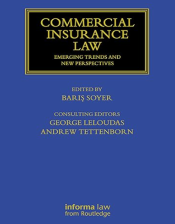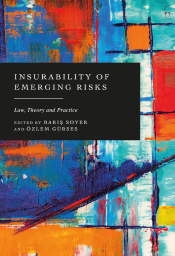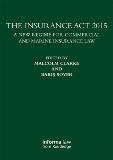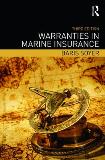Commercial Disputes - Resolution and Jurisdiction
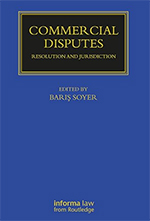
Edited by Professor B. Soyer and Professors Leloudas and Tettenborn as consulting editors
Published by Informa Law (Routledge) in 2024
This edited volume presents contributions from highly expert and experienced academics and practitioners, collectively examining a broad range of areas relating to the complex and time-consuming issues of resolution and jurisdiction of commercial disputes. The book is divided into three parts: arbitration and ADR, jurisdiction and procedure, and choice of law. Key topics featured include summary procedures in London Maritime Arbitration, reformation of the Arbitration Act, challenges to jurisdiction, stay of proceedings, anti-suit injunctions, the EU-UK judicial space post-Brexit, the application of AI to commercial disputes, and choice of law agreements.
The Montreal Convention - A Commentary
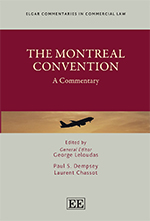
Edited by Professors George Leloudas, Paul Dempsey and Dr Laurent Chassot
Published by Elgar Publishing in 2023
The book, co-edited with Professor Paul Dempsey and Dr Laurent Chassot, is published by Edward Elgar Publishing, and is the first in the Elgar Commentaries in Commercial Law Series. 37 Montreal Convention experts have contributed to the book, providing a detailed article-by-article analysis of the Convention and surveying its meaning and application. Offering a forward-thinking perspective, chapters also bring to light critical scholarly debates concerning the potential revisions to the Convention and highlight the likely need for reform.
Damages, Recoveries and Remedies in Shipping Law
Edited by Professors B. Soyer and A. Tettenborn (Consulting Editor)
Published by Informa Law (Routledge) in 2023
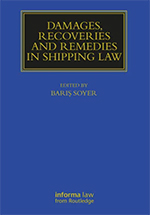
This edited volume brings together contributions from experienced academics and practitioners in shipping law to consider the crucial subject of remedies in shipping litigation.
The collection takes a close look at the established principles and recent legal, commercial and technical developments in the area of remedies in shipping law. It is divided into three parts. The first part focuses on fundamental common law principles concerning damages, including approaches to topics such as damages for delay and what happens when a charter is thrown over early; the reflective loss rule; mitigation; and the problem of cryptocurrency. The second part considers technology and how it affects contracts and remedies, including the use of new technologies and the development of new liability regimes. The third part explores contractual remedies other than simple compensatory damages, considering issues such as limitation of liability, punitive damages, specific remedies, third party claims and liabilities, and anti-suit injunctions.
Unmanned Ships and the Law
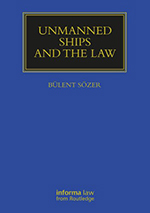
By Professor Bulent Sozer
Published by Informa Law (Routledge) in 2023
This book considers the law relating to the legal aspects of unmanned ships. It delves into the current international legal regime and examines the probable impact of unmanned ships on liability and carriage of goods in a wide-ranging manner. It also examines both the legal aspects and technological peculiarities of unmanned ships, as well as contemplating terminological and linguistic questions, to find out whether they can be compatible with the current legal regime applicable to ships in general, while considering alternatives to enable their successful use in the near future.
Ship Sale and Purchase (7th Ed)
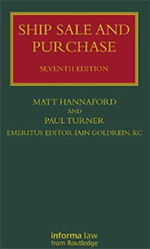
By Matt Hannaford, Paul Turner and Iain Goldrein
Published by Informa Law (Routledge) in 2023
Ship Sale and Purchase is the essential working guide for anyone involved in the business of making ship sale and purchase agreements and also in the resolution of disputes arising out of such agreements.
The seventh edition also includes commentary on changes in working practices such as the use of electronic signatures, the practice of "remote" closings, payment mechanisms and the impact of sanctions and anti-corruption legislation.
Disruptive Technologies, Climate Change and Shipping
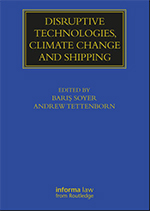
Edited by Professors B. Soyer and A Tettenborn
Published by Informa Law (Routledge) in 2022
This book analyses the impact of two vital and contemporary developments on shipping law and practice: disruptive technologies and climate change.
It considers the impact of these new technologies, honing on likely emerging issues and unresolved questions, especially about existing and potential private law liabilities and concentrates, from the point of view of English, EU and international law, on the legal implications of climate change and associated environmental risks in the shipping sector.
Marsden and Gault on Collisions at Sea (15th ed)
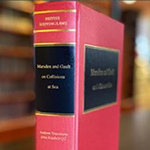
Edited by - Professor A. Tettenborn and John Kimbell KC
Published by Sweet & Maxwell in 2021
Marsden and Gault forms part of the highly respected British Shipping Law Series. It serves as an in-depth guide to the specialist and self-contained area of Collision and Loss in maritime law examining recent cases and convention developments. The 15th edition, edited by Professor Andrew Tettenborn and John Kimbell KC, has been updated not only in substance, but in arrangement, instigating a more modern and clearer structure. The commentary proceeds seamlessly from navigational fault and the interpretation of the Collision Regulations, towards special liability regimes and pollution and throughout the remainder of the text.
Artificial Intelligence and Autonomous Shipping: Developing the International Legal Framework
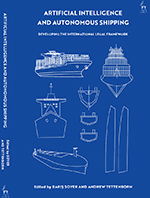
Edited by - Professors B. Soyer and A. Tettenborn
Published by Hart Publishing in 2021
This collection of essays critically evaluates the legal framework necessary for the use of autonomous ships in international waters. The work is divided into three parts: Part 1 evaluates how far national shipping regulation, and the public international law background that lies behind it, may need modification and updating to accommodate the use of autonomous ships on international voyages. Part 2 deals with private law and insurance issues such as collision and pollution liability, salvage, limitation of liability and allocation of risk between carrier and cargo interests. Part 3 analyses international convention regimes dealing with maritime safety and other matters, arguing for specific changes in the existing conventions such as SOLAS and MARPOL, which would provide the international framework that is necessary for putting autonomous ships into commercial use. The book also takes the view that amendment of international conventions is important in the case of liability issues, arguing that leaving such matters to national law, particularly issues concerning product liability, could not only restrict or hinder the availability of liability insurance but also hamper the development of technology in this field.
Ship Operations: New Risks, Liabilities and Technologies in the Maritime Sector
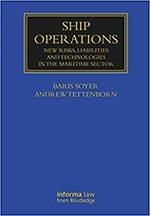
Edited by Professors B. Soyer and A Tettenborn
Published by Informa Law (Routledge) in 2020
The book is set out in three parts:
Part I offers a detailed and critical analysis of issues of contemporary importance concerning new liability regimes and developments.
Part 2 discusses how parties, in particular ship operators, attempt in contemporary practice to allocate their risks concerning ship operations.
Part 3 evaluates the legal position of those involved in more ‘back office’ operations.
Admiralty Claims
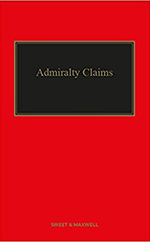
By Professor Andrew Tettenborn
Published by Sweet & Maxwell in 2020
The Book covers the rules and principles peculiar to admiralty claims and explains their relationship with related areas of substantive and adjectival law. It also investigates the theoretical underpinnings of the subject, in order to enhance understanding and to indicate novel lines of enquiry and contains a treatment in terms of detail and theoretical and practical methodology which is clearly superior to currently available.
NEW TECHNOLOGIES, ARTIFICIAL INTELLIGENCE AND SHIPPING LAW IN THE 21ST CENTURY
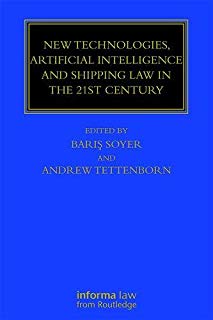
Edited by Professors B. Soyer and A Tettenborn
Published by Informa Law in 2019
The book is set out in three parts:
Part I offers a detailed and critical analysis of issues that are emerging, and those that are likely to emerge, from the use of advanced computer technology, particularly at the contracting process and in the context of issuing trading documents.
Part 2 focusses on artificial intelligence and discusses the contemporary issues that will emerge once autonomous ships and similar crafts are put to use in the world’s oceans. As well as this, the legal impact of ports utilising artificial intelligence and computer technology will also be considered.
Part 3 analyses how the increasing use of legal technology is changing insurance underwriting and shipping litigation.
Maritime Liabilities in a Global and Regional Context
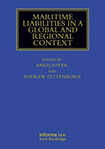
Edited by Professors B. Soyer and A Tettenborn
Published by Informa Law in 2018
The book is set out in two parts:
- Part I offers a detailed and critical analysis of issues of contemporary importance concerning maritime liabilities
- Part 2 discusses contemporary issues concerning the enforcement of maritime liabilities
An invaluable guide to recent legal and practical developments in maritime liabilities, this book is vital reading for both professional and academic readers.
Summerskill on Laytime 6th edition Edition
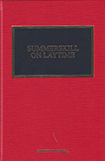
By Professor Simon Baughen
Published by Sweet & Maxwell in 2017
Summerskill on Laytime, a key and established title in this specialist field, comprehensively covers laytime and demurrage under English law.
Ideal for practitioners in the field, this title presents the principles behind laytime, the standard clauses, interruptions, suspensions, demurrage, detention and dispatch.
The new edition will cover recent case law as well as the 2013 Laytime Definitions for Charter Parties.
Charterparties - Law Practice and Emerging Legal Issues
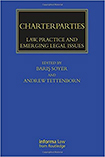
Edited by Professors B. Soyer and A Tettenborn
Published by Informa Law in 2017
This book consists of edited versions of the papers delivered at the Institute of International Shipping and Trade Law’s 12th International Colloquium at Swansea Law School in September 2016. Featuring a team of contributors at the top of their profession, both in practice and academia, these papers have been carefully co-ordinated so as to ensure to give the reader a first class insight into the issues surrounding charterparties.
The book is set out in three parts.
- Part I offers a detailed and critical analysis of issues of contemporary importance concerning time charters.
- Part 2 carries out a similar analysis with regard to voyage charterparties.
- Part 3 deliberates issues common to both type of charterparties.
Marsden and Gault on Collisions at Sea 14th ed

Edited by: Simon Gault, Steven Hazlewood, Andrew Tettenborn, Stephen Girvin, et al
Published by Sweet & Maxwell in 2016
Marsden and Gault – Collisions at Sea provides an in-depth guide to the rights and liabilities arising from a collision at sea, and is the undisputed authority in this field.
The new 14th edition reflects wide-ranging recent developments and will be the first port of call for practitioners advising on the implications of a particular collision or loss at sea.
- Covers both civil law and the possible criminal liability arising from a collision
- Provides unrivalled coverage of the underlying legal principles and the various international conventions that bear upon this area
- Examines new conventions, especially the Nairobi International Convention on the Removal of Wrecks
- Looks in detail at environmental issues, an increasingly important consideration in modern salvage operations
- Covers underwater cultural property and treasure
- Reviews regulatory developments, such as the formation of the European Maritime Safety Agency
- Analyses important recent case law in all areas of the text
- Considers trends in the awards of salvage arbitrators
- Deals with the practice and procedure of collision cases, incorporating the latest developments in the Civil Procedure Rules
- Looks at the Lloyd’s Open Form 2000, and changes to the SCOPIC clause
- Discusses the Corporate Manslaughter and Corporate Homicide Act 2007 and new SIs on substandard ships, ships in distress and reporting accidents
- Contains comprehensive Appendices of Merchant Shipping Regulations, ensuring they are easily available for reference during collision cases
Vitiation of Contractual Consent

By Peter Macdonald-Eggers
Published by Informa Law from Routledge in 2016
The validity of a contract can be undermined by factors affecting contractual consent. Issues of contractual validity frequently arise for consideration in all types of litigation, not least commercial disputes. This book provides practitioners and academics with an invaluable reference tool, which will enable them to navigate the complex issues of vitiation of contract.
When contractual disputes arise, there are a variety of vitiating factors which may be relied on to undermine a contract’s validity. This book provides a comprehensive examination of all the factors vitiating contractual consent from fraud, misrepresentation, non-disclosure, and mistake, to duress, undue influence, unconscionable bargains, and includes chapters on incapacity and unfairness. Each chapter gives a thorough account of the law on each of these vitiating factors, together with an overview of the remedies available. The book’s introduction considers the theoretical foundations of the law in this area.
Air Cargo Insurance

By Dr George Leloudas and Professor Malcolm Clarke
Published by Informa Law from Routledge in 2016
This book analyses the model policies and standard terms and conditions on the London markets. The authors also provide readers with an invaluable perspective on cases in other jurisdictions, and the book discusses freight forwarders’ relations with airlines and addresses the possibility of recovery from third parties.
This book, written by two of the leading experts in the field, provides invaluable guidance to practitioners, arbitrators and cargo-claims professionals. It will help to ensure that air cargo insurance contracts are better drafted and enforceable, as well as assisting in cases of disputed claims. Academics and postgraduate students specialising in the areas of in air and insurance law will also find this book extremely useful.
Insurance Act 2015: A New Regime for Commercial and Marine Insurance Law
Edited by Professors Malcolm Clarke (Cambridge University) and Baris Soyer (IISTL, Swansea University)
Published by Routledge in 2016
The Insurance Act 2015: A New Regime for Commercial and Marine Insurance Law analyses in depth the key aspects of the Act and extensively restates and modifies a number of legal principles applying both at common law and under the Marine Insurance Act 1906. Offering much more than the usual commentary on legislation, this book provides critical in-depth analysis of the important topics as was all coverage of areas likely to spawn disputes in future.
Written by leading practitioners and academics in the field, this book offers comprehensive, coherent and practical legal analysis of the changes introduced by the Insurance Act 2015. It is a key point of reference for practitioners, insurance professionals and academics.
Chapter 1: The Insurance Act 2015: Background and Philosophy- D. Hertzell, Consultant to BLM and Former Law Commissioner for Commercial and Common Law
Chapter 2: The Fair Presentation of Commercial Risks Under the Insurance Act 2015- P. MacDonald-Eggers KC, 7 KBW
Chapter 3: Insurer’s Duty of Good Faith—Path is Now Clear for Introduction of New Remedies?-Professor B. Soyer, Institute of International Shipping and Trade Law
Chapter 4: Future of Warranties and Other related Terms in Insurance Contracts-Professor M. Clarke, St Johns College Cambridge
Chapter 5: Remedies for Fraudulent Claims under the Insurance Act 2015- S. Rainey KC, Quadrant Chambers
Chapter 6: Late payment of Claims- Better, But by No Means Perfect-Professor A. Tettenborn, Institute of International Shipping and Trade Law
Chapter 7: Contracting out of the New Regime- Associate Professor G. Leloudas, Institute of International Shipping and Trade Law
Chapter 8: Reflections on the Changes Introduced by the Insurance Act 2015-Sir Bernard Rix, Arbitrator, Mediator, 20 Essex Street, Former Court of Appeal Judge
Warranties in Marine Insurance
By Professor B. Soyer
Published by Routledge in 2016 (3d edition)
The first edition of this monograph was published in 2001 and the second edition in 2005. The second edition has been influential in the reform process of insurance warranties. The eagerly anticipated third edition is brought up to date with significant discussion of recent case law including: Kosmar Villa Holidays v. Trustees of Syndicate; Pratt v Aigaion Insurance Co; Argo Systems FZE v. Liberty Insurance (Pte); The Buana Dua, The Princess of the Stars, The Nancy, and Garnat Trading & Shipping (Singapore) Pte Ltd v. Baominh Insurance Corporation with a view to identifying their impact on established legal principles. The third edition also goes on to evaluate the impact of the changes that will be introduced in this area by the Insurance Act 2015. This Act will alter the warranty regime significantly but it is also expected to have an impact on other risk alteration clauses such as condition precedents, suspensory warranties and exclusion clauses.
International Trade and Carriage of Goods
Edited by Professors B. Soyer and A Tettenborn
Published by Informa Law in 2014
This book consists of edited versions of the papers delivered at the Institute of International Shipping and Trade Law’s 11th International Colloquium, held at Swansea Law School in September 2015. Featuring a team of contributors at the top of their profession, both in practice and academia, these papers have been carefully co-ordinated so as to ensure to give the reader a first class insight into the issues surrounding international sale and carriage contracts.
Part 1: Contemporary Issues in International Sale Contracts
1. What Is A Reasonable Contract of Carriage for CIF/CIP purposes? – Section 32(2) of the Sale of Goods Act 1979 - Ruth Hosking, Quadrant Chambers
2. Slow Steaming Clauses and International Sale Contracts: A Successful Marriage? - Dr Theodora Nikaki, IISTL, Swansea University
3. Laytime and Demurrage in CIF and FOB Contracts - Professor Simon Baughen, IISTL, Swansea University
Part 2: Carriage and Sales
4. "Who’s Doing What and for Whom?" Recent Developments on Delegated Contractual Performance - Simon Rainey KC, Quadrant Chambers
5. Consignees’ Rights under the Rotterdam Rules - Professor Michael F. Sturley, Texas University
6. Consignees' Rights in European Legal Systems - Frank Stevens, Erasmus University
7. Discrepant Declarations about Containerised Goods "… in the middle of a chain reaction" - Professor Olivier Cachard, University of Lorraine
8. Letter of Indemnity against Delivery without Bill of Lading - Professor Richard Williams, IISTL, Swansea University
9. The Rising Tide of Paperless Trade: Analysing the Legal Implications - Dr Miriam A. Goldby, Queen Mary University
Part 3: Payment and Security
10. Economic Sanctions and Letters of Credit in International Transactions - Damian Honey, Holman Fenwick and Willan
11. Islamic Letters of Credit – Square Peg in a Round Hole - Professor Jason Chuah, City University
12. Do I Want My Documents back? A Documentary Credit Dilemma - Stuart Shepherd, Ince & Co
13. Lending on Waybills and Other Documents - Banker’s Dream or Financier’s Nightmare - Professor Andrew Tettenborn, IISTL, Swansea
Part 4: Contemporary issues in Cargo Insurance
14. Cargo Insurance and open Covers - Peter MacDonald Eggers KC, 7 King's Bench Walk
15. The ICC Transit Clause- Developments and Faultlines - Sara Cockrill KC, Essex Court Chamber
16. Insuring Cargoes in the New Era- Impact of the Insurance Act 2015 on Standard cargo Clauses/Wordings - Professor B. Soyer, IISTL, Swansea University
Ship Building, Sale and Finance
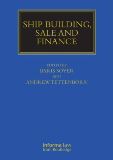
Edited by Professors B. Soyer and A Tettenborn
Published by Informa Law in 2015
The book presents a detailed and critical analysis of standard and non-standard shipbuilding and sale contracts, including vital but often overlooked issues such as payment and refund guarantees, which have been at the forefront of recent litigation and practice. It also critically and thoroughly analyses several types of standard insurance contracts, including shipbuilder's risks and mortgagee's interests, and provides a critical and contemporary discussion on the legal and practical issues surrounding ship finance, ship mortgages and more esoteric issues such as the use of bareboat charters and financial derivatives.
Part I: Legal issues relating to ship building
Chapter 1- Contracting by Numbers: The Different Characteristics of the Main Shipbuilding Contracts Professor Andrew Tettenborn
Chapter 2 - The BIMCO Newbuildcon Standard Form Shipbuilding Contract: Salient Features and Pitfalls Chris Kidd
Chapter 3 - Remedies for Breach of Shipbuilding Contracts- Is English Law 'Fit for Purpose'? Simon Curtis
Chapter4 - The Application of the 'Prevention Principle' in the Ship Building Context Simon Kverndal KC
Chapter 5 - Drafting and Interpreting Payment and Refund Guarantees in the Shipbuilding Context John Forrester
Chapter 6 - The Evolving Nature of Builders' Risks Cover Professor Baris Soyer
Part II: Ship sale contracts and practice
Chapter 7- Battle of the Sale Forms Matt Hannaford
Chapter 8 - 'As Is'…As You Were? The Union Power and 'As Is' Provisions in Ship Sale and Purchase Contracts
Chapter 9 - The Practicalities of Ship Sales in the Current Market William Maclachlan
Part III: Legal and practical issues relation to ship finance
Chapter 10 - Ship Mortgages: Enforcement and Remedies Charles Buss
Chapter 11 - Mortgagees' Interest Insurance Peter Macdonald Eggers KC
Chapter 12 - LeaseFinance and Demise Charters-Lessors’ Risks and Liabilities Professor Simon Baughen
Chapter 13 - Financing Newbuilding Vessels and Barecon 2001: A Fair Deal? Dr Theodora Nikaki
Chapter 14 - Shipping Finance and Sanctions David Osborne
Chapter 15 - Using Derivatives to Finance Ship Sales and Shipbuilding: A Civil Law Perspective Professor Dr Olivier Cachard
Offshore Contracts and Liabilities
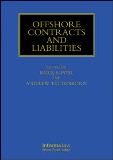
Edited by Professors B. Soyer and A Tettenborn
Published by Informa Law in 2014
Written by a team of top academics and highly-experienced legal practitioners, this is a very complex area of law. It provides both a critical analysis on contemporary legal issues concerning offshore contracts, and an in-depth account of the numerous liability regimes inherently connected to offshore operations
PART 1- Offshore Contracts
Chapter 1 -BIMCO’s Offshore Contracts. Grant Hunter
Chapter 2- Key Aspects of New WINDTIME Form. Lars Rosenberg Overby
Chapter 3- HEAVYCON 2007: Liabilities, Exceptions, Indemnities. Professor Simon Baughen
Chapter 4 - Knock for Knock Clauses in Offshore Contracts- The Fundamental Principles. Richard Williams
Chapter 5 -The Construction of Mutual Indemnities and ‘Knock for Knock’ Clauses. Simon Rainey KC
Chapter 6 - Consequential Loss Exclusion Clauses in Offshore Contracts: The Need for Greater Clarity. Mr Chris Kidd
Chapter 7 - Excluding Consequential Damages. Robert Gay
Chapter 8 - Wilful Misconduct and Gross negligence Exclusions in ‘Knock for Knock’ Provisions in Offshore Contracts. Elizabeth Blackburn KC and Jeremy Lightfoot
Chapter 9 - Knock for Knock- The P & I Perspective. Fabien Lerede
Chapter 10 - Standard Contracts Used in the Offshore Insurance Sector: Clear and Unambiguous? Professor Baris Soyer and Dr George Leloudas
PART 2- Offshore Liabilities
Chapter 11 - Pollution from Offshore Rigs and Installations- UK Law- Stephen Tromans KC
Chapter 12 - Norwegian Perspective with regard to Liability Regimes Concerning Oil Rigs and Installations. Professor Erik Rosaeg
Chapter 13 - Offshore Injury- Whose Jurisdiction, What Law? Professor Andrew Tettenborn
Chapter 14 - Marine Spatial Planning- An Incoming Tide of Opportunity or Liability? Gregory Jones KC and David Graham
Marine Insurance Fraud
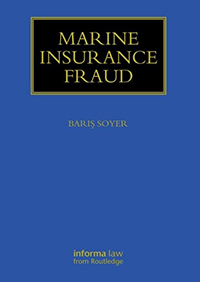
By Professor B. Soyer
Published by Informa Law in 2014
2015 BILA Book Prize
This book provides a comprehensive and coherent legal analysis of the impact of fraud on the position of various parties to a marine insurance contract, as well as the cover provided by standard marine policies. The issues under discussion in this invaluable guide are also equally relevant in the context of non-marine insurance contracts. Helpfully divided into two parts; the first part deals with the impact of fraud committed by parties to an insurance contract i.e. the assured, brokers and insurers.
The second part analyses the extent to which standard marine policies cover the fraudulent and dishonest activity of third parties to an insurance contract. This book will be of huge practical assistant to practitioners specialising in marine insurance as well as insurance generally, and to professionals, academics and post-graduate students.
Carriage of Goods by Sea, Land and Air
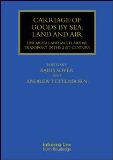
Edited by Professors B. Soyer and A Tettenborn
Published by Informa Law in 2013
Written by a combination of top academics, industry experts and leading practitioners, this book offers a detailed insight into both unimodal and multimodal carriage of goods. It provides a comprehensive and thoroughly practical guide to the issues that matter today on what is a very complex area of law. From the papers delivered at the 8th International Colloquium organised by Swansea Law School's prestigious Institute of International Shipping and Trade Law, this original work considers current opinions, trends and issues arising from contracts of carriage of goods by sea, land, air, and multi-modal combinations of these, not to mention the legal position of vital participants such as freight forwarders, terminal operators and cargo insurers. The topics under discussion range through issues such as paperwork, piracy, liability for defective containers, damage in transit, the CMR Convention, and the possible effects of the Rotterdam Rules.
PART 1 Carriage of Goods by Sea
Chapter 1- Piracy and Contracts of Carriage by Sea. Simon Rainey, KC (Quadrant Chambers, London).
Chapter 2 - Liability for Defective Containers: Charting A Course between Seaworthiness, Care for the Cargo and Liabilities of Shippers. Frank Stevens (Roosendaal Kezer Advocaten, Antwerp).
Part 2 Carriage of Goods by Land and Air
Chapter 3 - Liability, Jurisdiction and Enforcement Issues in International Road Carriage - CMR Carrier Liability in the Netherlands and Germany and the Influence of the EU. Dr Marian Hoeks (Erasmus School of Law, Rotterdam).
Chapter 4 - Integrating International Air and Road Carriage: Operational and Liability Issues. Dan Soffin (Solicitor, Gates & Partners, London & New York).
Chapter 5 - Multimodal Transport under the Warsaw and Montreal Convention Regimes: A Velvet Revolution?. Dr George Leloudas (IISTL, Swansea University).
Part 3- Multimodal Transport: Current Practice and Future
Chapter 6 - Who Contracts with Whom? An Analysis of Chinese Exports to the United Kingdom. Craig Neame (Holman, Fenwick & Willan, London.
Chapter 7 - Of Bills of Lading, Multimodal Transport Documents, and Other Things. Professor Andrew Tettenborn(IISTL, Swansea University).
Chapter 8 - International Sale Contracts and Multimodal Transport Documents- Two Issues of Significance. Professor D. Rhidian Thomas (IISTL, Swansea University).
Chapter 9 - All tied up? The Potential Impact of the Rotterdam Rules on Shippers’ Obligations to Carriers under Bill of Lading Clauses in respect of Goods Shipped. David Glass (Cardiff University).
Chapter 10 -. Multimodal Bills of Lading and Limitation. Christopher Hancock KC (20 Essex Street, London).
Chapter 11 - The Quest for An International Multimodal Transport Convention: Does the CMR Liability System Fit the Bill?. Dr Theodora Nikaki (IISTL, Swansea University).
Chapter 12 - The Overall Impact of the Rotterdam Rules on the Liability of Multimodal Carriers and their Sub-contractors. Richard Williams (IISTL, Swansea University).
Chapter 13 - The European Project on Sustainable Multimodal Transport – Is a Harmonized Liability System the Right Tool? Dr Ellen Eftestøl-Wilhelmsson (University of Helsinki and Scandinavian Institute of Maritime Law).
Part 4 Market Participants
Chapter 14 -The Liability of Freight Forwarders. Professor Francis Reynolds KC (University of Oxford).
Chapter 15 - Terminal Operators and Liability for Cargo Claims under English Law. Professor Simon Baughen (Bristol University).
Chapter 16 - Cargo Insurance in the Multimodal Context – Full and Complete Cover? Professor Barış Soyer(IISTL, Swansea University).
Emerging Challenges for the law of the Sea - Legal Implications and Liabilities
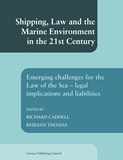
Edited by Richard Caddell and Rhidian Thomas
Published by Lawtext
This book brings together detailed papers on how the international Law of the Sea is evolving due to developing technologies, modern shipping and exploitation of marine resources. Conflicting uses of the oceans, threats to the marine environment, and new navigational controls are all examined by experts in the fields of the law of salvage, Arctic passage, piracy, carbon capture and storage, wind farm development and the control of oil pollution in the wake of the Deepwater Horizon disaster.
Contents and Contributors
Foreword – Sir Michael Wood KCMG
Introduction – Dr Richard Caddell, Professor D Rhidian Thomas
Chapters
The future of navigation in ice-covered areas: a view from the Arctic. Professor Tore Henriksen (Professor of Law, University of Tromsø)
International straits, compulsory pilotage and the protection of the marine environment. Dr Edwin Egede (Senior Lecturer in International Law and International Relations, Cardiff University, Barrister and Solicitor of the Supreme Court of Nigeria)
The growing establishment of high seas marine protected areas: implications for shipping. Professor Robin Churchill (Professor of International Law, University of Dundee)
Shipping and the conservation of marine biodiversity: legal responses to vessel-strikes of marine mammals. Dr Richard Caddell (Institute of International Shipping and Trade Law, Swansea University)
Ballast water management: regulatory challenges and opportunities. Dr Rosalie Balkin (Assistant Secretary-General, Director, Legal Affairs and External Division, International Maritime Organization (IMO))
Marine salvage and the environment: developments, problems and prospects. Professor D Rhidian Thomas (Emeritus Professor of Maritime Law, Founder Director of the Institute of International Shipping and Trade Law, Swansea University)
Dealing with maritime emergencies in the United Kingdom: the role of the SOSREP. Hugh Shaw (Secretary of State’s Representative for Maritime Salvage and Intervention (SOSREP))
The Deepwater Horizon disaster: the regulatory response in the United Kingdom and Europe. Greg Gordon (Senior Lecturer in Law, University of Aberdeen
Scrapping of vessels and offshore installations: regulation and liability). Professor M N Tsimplis (School of Law, University of Southampton)
The use of the sea for wind energy projects. Dr Stefan Schmitz (Partner, Reed Smith LLP)
The emerging international regulation of carbon storage in sub-seabed geological formations. Dr Susanna Much (Legal Adviser at the Federal Ministry for the Environment, Nature Conservation and Nuclear Safety, Berlin)
Pipelines and protected sea areas. Professor Alexander Proelss (Professor of Public Law, Director, Institute of Environmental and Technology Law, University of Trier)
Protection of the underwater cultural heritage. (Professor Tullio Scovazzi Professor of International Law, University of Milano-Bicocca, Milan)
Emerging threats to shipping security: the evolution of legal norms. Judge Rüdiger Wolfrum (Member of the International Tribunal for the Law of the Sea)
Pollution at Sea: Law and Liability
Edited by Professors B. Soyer and A Tettenborn
Published by Informa in 2012
This book is based on papers presented at the Seventh International Colloquium on Pollution at Sea organised by the Institute of International Shipping and Trade Law, Swansea University, in September 2011. It focuses on a number of the vital private law issues – compensation, insurance, contract and tort – thrown up by contemporary developments in the law of pollution and also intends to offer a critical analysis on emerging public law concepts, such as the legal position of seafarers from the perspective of criminal law in cases of pollution and the impact of port state control as a pollution control mechanism.
Contributors and Contents:
PART 1 - VARIOUS LIABILITY REGIMES: INTERNATIONAL, REGIONAL AND NATIONAL
Chapter 1 - Mr Patrick Griggs CBE, Past President of CMI, UK
Torrey Canyon, 45 Years on - Have We Solved All the Problems?
Chapter 2 - Mr Colin de la Rue, Partner, Ince & Co, London, UK
Liability for Pollution from Ships Bunkers
Chapter 3 - Mr Mans Jacobbson, Former Director, International Oil Pollution Compensation Funds, Sweden
The HNS Convention and Its 2010 Protocol
Chapter 4 - Professor Baris Soyer, Director of the Institute of International Shipping and Trade Law, UK
Compensation for Pollution Damage Resulting from Exploration for and Exploitation of Seabed Mineral Resources
Chapter 5 - Mr Charles B. Anderson, Skuld North America, USA
Proposals for Legislative Reform Following the Deepwater Horizon Oil Spill
Chapter 6 - Simon Rainey KC, Barrister Quadrant Chambers, London, UK
To the Great Damage and Common Nuisance of All Liege Subjects of Our Lady the Queen: Oil Pollution Claims and Public Nuisance
Chapter 7 - Mr Luc Grelett, Partner, Reed Smith, Paris, France
Avoiding International Legal Regimes- The Erika Experience
Chapter 8 - Mr Henrik Ringbom, Head of Unit, Marine Environment, Training and Statistics, at the European Maritime Safety Agency, Portugal
Maritime Liability and Compensation in EU Law
PART 2- POLLUTION LIABILITIES AND THIRD PARTIES
Chapter 9 - Mr Archie Bishop, Holman Fenwick Willan, London, UK
Environmental Salvage- Time for A Change?
Chapter 10 - Mr Luke Readman, Retired Chairman, Thomas Miller Ltd, UK
Recent Developments in P&I Cover for Pollution: Terrorism, Piracy and Sanctions
Chapter 11 - Richard Williams, Member of the Institute of International Shipping and Trade Law, UK
The Liability of Charterers for Marine Pollution
Chapter 12 - Professor Andrew Tettenborn, Member of the Institute of International Shipping and Trade Law, UK
Marine Pollution - Unorthodox Suits and Unorthodox Defendants
PART 3 - PUBLIC LAW ASPECTS
Chapter 13 - Mr Simon Baughen, Reader in Law, University of Bristol, UK
Maritime Pollution and State Liability
Chapter 14 - Professor Marc Huybrechts, Emeritus Professor of Law, University of Antwerp and University of Leuven, Belgium
Whatever Happened to European Directive 2005/35/EC? Europe's Ambivalent Approach to the Fight against Marine Pollution and its Consequences for Seafarers
Chapter 15 - Dr Oya Ozcayir, Maritime Consultant and Member of the Izmir Bar, Turkey
Impact of Port State Control on Pollution at Sea
Contractual Duties: Performance, Breach, Termination and Remedies
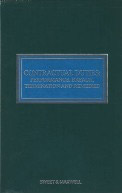
Professor Andrew Tettenborn, Professor Malcolm Clarke, Neil Adams and Professor Graham Virgo
Published by Sweet & Maxwell in 2012
Contractual Duties: Performance, Breach, Termination and Remedies presents a high level analysis of the law relating to the termination of contracts. It offers new and authoritative insights into how to proceed when contracts are breached or break down. This is a critical area of commercial practice, at the heart of litigation about contracts. The work explores how parties to contracts are deemed to have abided by the contract, how contracts break down and the remedies available when they do. Recent case law is examined in depth.
While the central focus is English contract law, this is complemented by a comparative dimension showing how other systems have different approaches, and suggesting new ideas drawn from the US, Australia and civil law systems.
The Carriage of Goods by Sea Under the Rotterdam Rules
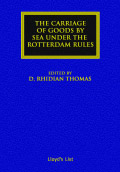
Edited by Professor D. Rhidian Thomas
Published by Informa International in 2010
This book is based on papers presented at the Sixth International Colloquium on Cargo Claims Under The International Conventions – From The Hague To The Proposed Rotterdam Rules organised by the Institute of International Shipping and Trade Law, Swansea University, in September 2009. The Carriage Of Goods By Sea Under The Rotterdam Rules examines virtually all aspects of the Rules and will provide an effective, reliable and readable guide to everyone seeking a complete grasp of the Rules.
The sixteen contributions have been written by a team of international experts who collectively submit the newly proposed Rotterdam Rules to a sustained, penetrative and comprehensive analysis.
Contents and Contributors;
Chapter 1- The Emergence and Application of the Rotterdam Rules. Professor D.Rhidian Thomas (IISTL, Swansea University)
Chapter 2- From Treaty to Trial- The Implementation of the Rotterdam Rules.
Michael Harakis (Solicitor, Hill Dickinson LLP and Advisor to the Department of Transport)
Chapter 3- Interpreting International Transport Conventions. Mr Simon Rainey K.C., (Quadrant Chambers, London)
Chapter 4- Freedom of Contract within the Province of the International Conventions.
Professor Andrew Tettenborn (Exeter University)
Chapter 5 -Multimodal Transport under the Rotterdam Rules. Professor Ralph de Wit (Van Dooselaere Advocaten, Antwerp; University of Antwerp)
Chapter 6- Duties of Carriers – care and seaworthiness. Mr Andrew Nicholas (Clyde & Co, London)
Chapter 7- Limitation of Liability. Professor Marc Huybrechts (University of Antwerp)
Chapter 8- Exclusion of Liability. Mr Julian Clark (Holman Fenwick and Willan, London and Jeffrey Thomson, Hardwicke Chambers, London)
Chapter 9- Duty to Deliver Cargo and Consequences of Misdelivery. Mr Simon Baughen (University of Bristol).
Chapter 10- The Division of the Burden of Proof. Dr Nick Margetson (University of Amsterdam)
Chapter 11- Duties of Shippers. Mr Frank Stevens (Roosendaal Keyzer Advocaten, Antwerp)
Chapter 12- Deck cargo. Dr Susan Hodges and Mr David Glass (Cardiff University)
Chapter 13- Transport Documents. Emeritus Professor Francis Reynolds K.C. (University of Oxford)
Chapter 14 -Electronic Documents under the Rotterdam Rules. Mr David Martin-Clark (Stone Chambers, London)
Chapter 15 - Himalaya Clauses – The Impact of the Rotterdam Rules. Professor Jason Chuah (Westminster University)
Chapter 16 - Jurisdiction Clauses and Arbitration Agreements. Professor Yvonne Baatz (Southampton University)
The Law of Damages (2nd ed)

by Professor Andrew Tettenborn
Published by LexisNexis Butterworths
Now in its second edition this essential text on the Law of Damages provides a comprehensive and authoritative account of the legal principles to be applied in assessing damages. It examines the current law and also highlights areas for possible future development.
The text covers all the key areas and general principles of damages making it an essential text for both practitioners and academics.
Risk and Liability in Air Law

Dr George Leloudas
Published by Informa in 2009
The book analyses the transformation of the notion of risk over time and identifies the ways and the extent to which social perceptions have influenced the liability of airlines in the aftermath of safety accidents (Warsaw Convention System, Montreal Convention, Rome Convention, and New General Risks Convention) and terrorism-related incidents (New Unlawful Interference Convention). It is the first attempt to analyse the relevant international conventions governing the liability of airlines to passengers and third parties on the ground from a risk perspective. The book is based on the PhD thesis of Dr Leloudas which has been awarded a PhD by Cambridge University.
The Modern Law of Marine Insurance (Vol.3)
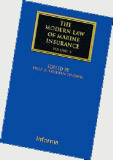
Edited by Professor D. Rhidian Thomas
Published by Informa International in 2009
Modern Law of Marine Insurance, Volume 3 focuses on current issues affecting the law and practice of the market.
Contents and Contributors
Chapter 1 - Drawing Lines- in the Sand. Professor Malcolm A. Clarke.
Chapter 2 - The Concept and Measure of Indemnity in Marine Policies. Professor D Rhidian Thomas.
Chapter 3 - The Doctrine of the Undisclosed Principal and Contracts of Insurance. Professor Howard Bennett.
Chapter 4 - Fraud and Insurance Agents: The Law After Moore Stephens. Professor Robert Merkin.
Chapter 5 - Warranties and Utmost Good Faith in US Marine Insurance Contracts. Professor Martin Davies.
Chapter 6 - Insuring Cargoes in the New Millennium:The Institute Cargo Clauses 2009. John Dunt and William Melbourne.
Chapter 7 - Coverage against Unlawful Acts in Contemporary Marine Policies. Professor Baris Soyer.
Chapter 8 - Challenges in Modern Marine Insurance of Shipowners’ Interests: Piracy and Terrorism. Professor Trine-Lise Wilhelmsen.
Chapter 9 - Can A Marine Insurer be Liable for Loss Consequential upon the Late Payment of Indemnity? David Foxton K.C.
Chapter 10 - Recent Developments in Party Choice of the Applicable Law and Jurisdiction in Marine Insurance and Reinsurance Contracts. Professor Yvonne Baatz.
A New Convention for the Carriage of Goods by Sea: The Rotterdam Rules
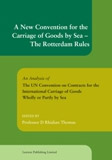
Edited by Professor D. Rhidian Thomas
Published by Lawtext in 2009
The new Convention, known as the Rotterdam Rules and open for signature in September 2009, represents a radical attempt to establish a single uniform legal regime for the carriage of goods by sea. This book has been compiled specially in readiness for the occasion and as an essential aid to all those concerned to absorb the complexities of the new Convention. The response of the international community to the Rotterdam Rules will depend upon a full understanding of the Convention and this expert analysis provides a comprehensive and perceptive commentary of the principal provisions, implications and themes, with detailed comparisons to the Hague-Visby Rules and multimodal conventions.
Contents and Contributors
Chapter 1-An introduction to the preparation, philosophy, and potential impact of the Rotterdam Rules. Professor Michael F. Sturley (Stanley D. and Sandra J. Rosenberg Centennial Profesor of Law, The University of Texas School of Law).
Chapter 2-Multimodal transport under the Convention -Christopher Hancock (KC, 20 Essex Street, London).
Chapter 3-The liability regime of carriers and maritime performing parties. Professor D Rhidian Thomas (Director of the Institute of International Shipping and Trade Law, School of Law, Swansea University).
Chapter 4-The obligations of carriers to provide seaworthy ships and exercise care. Dr Theodora Nikaki (Lecturer in Law, Institute of International Shipping and Trade Law, School of Law, Swansea University).
Chapter 5-The right of the carrier to exclude and limit liability. Professor Stephen Girvin (Faculty of Law, National University of Singapore).
Chapter 6-Loss due to a combination of causes: burden of proof and commercial risk allocation.
Dr Regina Asariotis (Chief, Policy and Legislation Section, Division on Technology and Logistics, United Nations Conference on Trade and Development (UNCTAD) Geneva)
Chapter 7-Obligations owed by the shipper to the carrier. Simon Baughen (School of Law, University of Bristol).
Chapter 8-Transport documentation – the new approach. Richard Williams (Visiting Professor of Law, Institute of International Shipping and Trade Law, Swansea University).
Chapter 9-Electronic alternatives to transport documents. Miriam Goldby (Lecturer in Law, University of Surrey)
Chapter 10-Delivery of the goods, rights of the controlling party and transfer of rights. Professor G J van der Ziel (Erasmus University, Rotterdam).
Chapter 11-Jurisdiction and arbitration. Professor Yvonne Baatz (Professor of Maritime Law and Member of the Institute of Maritime Law, University of Southampton).
Chapter 12-A critique of the Rotterdam Rules-Professor William Tetley (McGill Law Faculty, McGill University, Montreal).
The Evolving Law and Practice of Voyage Charterparties

Edited by Professor D. Rhidian Thomas
Published by Informa International in 2009
The Evolving Law and Practice of Voyage Charterparties focuses upon voyage charterparty contracts and addresses complex legal and practical issues arising out of the relationship between voyage charterparty contracts, bills of lading and international sale contracts. This book is the collection of the papers presented by experts in the field from the UK and abroad at the Fourth Annual International Colloquium of the Institute of International Shipping and Trade Law on Voyage Charterparties (Swansea, 11-12 September 2008).
Table of Contents:
Chapter 1-The evolving nature of voyage charterparties. Professor D Rhidian Thomas (Director of the ISTL, Swansea University).
Chapter 2- Jurisdiction and arbitration clauses. Steven Gee K.C. (Stone Chambers).
Chapter 3- Legal aspects of the approach voyage. Richard Lord K.C. (Brick Court Chambers).
Chapter 4-The loading obligations of voyage charterers. Dr Theodora Nikaki (ISTL, Swansea University).
Chapter 5-The wreck of the Hesperus Revisited: A review of the obligations of seaworthiness in contracts of affreightment. Charles Baker (North of England, P & I Club).
Chapter 6- Dangerous cargo and "legally dangerous" cargo. Robert Gay (Hill Dickinson, London).
Chapter 7- Arrival, readiness and the commencement of laytime. Simon Rainey K.C. (Quadrant Chambers).
Chapter 8- The Running of Laytime and Demurrage when the charterer does not have sole use of a vessel. Mark Hampsher (Maritime Arbitrator).
Chapter 9- Laytime and demurrage clauses in contracts of sale-A survey of the New York Society of Maritime Arbitrators Award (1978-2008) and English Law. Professor Jason Chuah (Westminster University).
Chapter 10-Bills of lading and voyage charters. Emeritus Professor Francis Reynolds K.C.(Oxford University).
Chapter 11-Charterparty bills of lading cargo interest's liabilities to the shipowner. Simon Baughen (Bristol University).
Chapter 12- The Bill of lading contracts under European national laws. Professor Frank Smeele (Erasmus University, Rotterdam).
Chapter 13- Comparative observations on US law and practice relating to voyage charters. Le Roy Lambert (Blank Rome LLP, New York).
Chapter 14- The Impact of Deviation on Contracts of Affreightment. Richard Williams (ISTL, Swansea University).
Chapter 15-Cancellation clauses and repudiatory breach. Emeritus Professor Michael Furmston (Bristol University).
Chapter 16- Frustration in voyage charters: Silted-up Backwater or vital navigational Resource? Professor Andrew Tettenborn (Exeter University).
Reforming Marine and Commercial Insurance Law
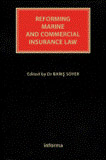
Edited by Dr. Baris Soyer
Published by Informa International in 2008
Reforming Marine and Commercial Insurance Law provides a comprehensive, coherent and practical legal analysis of the work currently undertaken by the English and Scottish Law Commissions with a view to reforming the current legal regime. Written by a team of experts from the legal profession, insurance market and academia, this book offers a critical discussion on the legal and practical implications of planned law reform in this area. Reforming Marine and Commercial Insurance Law is the collection of the papers delivered at the Symposium on the Law Commissions’ Reform Proposals on Marine and Commercial Insurance, which was hosted by the Institute of International Shipping and Trade Law in collaboration with the English Law Commission in July 2008.
Table of Contents:
Chapter 1-Insurance Contract Law Reform in England (and Wales) and Scotland. David Hertzell (Law Commissioner).
Chapter 2-Pre-contractual Information Duties and the Law Commissions' Review. Martin Bakes (Partner, Herbert Smith LLP).
Chapter 3- Materiality: The Search for Practicality. Alan Weir (Partner, Ince & Co).
Chapter 4- Reforming Pre-contractual Information Duties of the Intermediaries of the Assured. Professor Rob Merkin (University of Southampton and Consultant Barlow Lyde and Gilbert LLP).
Chapter 5- Reforming Warranties. The Hon Mr Justice Aikens (High Court of Justice).
Chapter 6- Reforming Insurance Warranties: Are We Finally Moving Forwards? Dr Baris Soyer (Institute of International Shipping and Trade Law, Swansea University).
Chapter 7- Reflections on Values. Professor Howard Bennett (Hind Professor of Commercial Law, University of Nottingham)
Chapter 8- Reforming Insurable Interest. Mr Mark Templeman KC (Barrister, Essex Court Chambers)
Chapter 9- Utmost Good Faith and the Presentation and Handling of Claims. Peter MacDonald Eggers (Barrister, 7 King’s Bench Walk)
Chapter 10- Law Commissions Reform Proposals on Marine and Commercial Insurance: A Practitioner's Perspective. Derrick Cole (Past BILA Chairman and Broker).
Legal Issues Relating to Time Charterparties
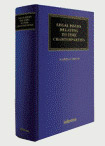
Edited by Professor D. Rhidian Thomas
Published by Informa International in 2008
This book is the work product of the successful third organised by the Institute of International Shipping and Trade Law, in July 2007. It addresses all the major questions and issues that arise in connection with time charterparties, examining them in a logical manner, progressively tracing the subject from the creation to the termination of the contract. All the salient and central legal aspects of time charterparties are examined, with the law analysed in its commercial context, particularly in relation to the various ways in which time charterparties may be used in shipping and international trade.
Chapters featured in this book include:
Chapter 1- Standard Forms - the BIMCO experience. Grant Hunter (BIMCO, Denmark)
Chapter 2- Construing terms in time charterparties Beginning of a new era or business as usual?. Dr Baris Soyer (Institute of International Shipping and Trade Law, Swansea University)
Chapter 3 - Ascertaining the charter period. Paul Herring (Partner, Ince & Co, UK)
Chapter 4 - Safe ports and places. Professor Howard Bennett (Hind Professor of Commercial Law, University of Nottingham)
Chapter 5 - Seaworthiness and the 'Hong Kong Fir' decision. Mark Hamsher (Maritime Arbitrator, UK)
Chapter 6 -Indemnities in time charters. David Foxton KC (Barrister, Essex Court Chambers)
Chapter 7 - Time charterparty hire: Issues relating to contractual remedies of default and off hire clauses. Professor D Rhidian Thomas (Director, Institute of Shipping and International Trade Law, Swansea University)
Chapter 8 - Assignees of hire: how fare can they ignore charters' claims against owners? Professor Andrew Tettenborn (Exeter University)
Chapter 9 - Time charterparties and bills of lading. Emeritus Professor Francis Reynolds KC (University of Oxford)
Chapter 10 - Clauses paramount in time charters. Professor Yvonne Baatz (University of Southampton)
Chapter 11 - War, terror, piracy and frustration in a time charter context. Professor Keith Michel (UCL)
Chapter 12 - Termination rights under time charters. John D. Kimball (Partner, Blank Rome LLP, USA)
Chapter 13 - The allocation of cargo claims between owners and charterers in NYPE charterparties. Dr Theodora Nikaki (Institute of International Shipping and Trade Law, Swansea University)
Chapter 14 - Containerisation, slot charters and the law. Christopher Hancock KC (Barrister, Essex Street Chambers, UK)
Chapter 15 - Damages for breach of time charter: some recent developments. Andrew Taylor (Partner, Reed Smith Richards Butler)
Chapter 16 - The effectiveness of liens as a self-help remedy? Richard W. Williams (Institute of International Shipping and Trade Law, Swansea University).
The New Global Trading Order
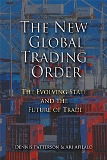
The Evolving State and the Future of Trade
by Professors Dennis Patterson and Ari Afilalo
Published by Cambridge University Press in 2008
The international institutions that have governed global trade since the end of World War II have lost their effectiveness, and global trade governance is fractured. The need for new institutions is obvious, and yet, few proposals seem to be on offer. The key to understanding the global trading order lies in uncovering the relationship between trade and the State, and how the inner constitution of Statecraft drives the architecture of the global order and requires structural changes as the State traverses successive cycles. The current trade order, focused on the liberalization of trade in goods and services and the management of related issues, is predicated on policies and practices that were the product of a global trading order of the 20th-century modern nation-states. Today, a new form of the State – the post-modern State – is evolving. In this book, the authors propose a new trade norm – the enablement of global economic opportunity – and a new institution – the Trade Council – to overhaul the global trading order.
Liability Regimes in Contemporary Maritime Law

Edited by Professor D. Rhidian Thomas
Published by Informa International in 2007
This book is the work product of the successful International Colloquium on Maritime Legal Liabilities, organised by the Institute in September 2006. It addresses the topical and current issues in maritime law and brings them together into a coherent strand by the common perspective of liabilities.
Chapters featured in this book include:
Chapter 1 - Ship Source Pollution-Oil and Hazardous and Noxious Substances. Mr Måns Jacobsson (Director of the IOPC Funds, Visiting Fellow ISTL)
Chapter 2 - Pollution from Ships: EU Directive on Criminal Sanctions for Ship-Source Pollution (Mr Colin de la Rue, Ince & Co, London)
Chapter 3 - Marine Pollution Liabilities under US Law. Professor Robert Force (Director Emeritus, Maritime Law Centre, Tulane University)
Chapter 4 - Liabilities of Ports in respect of Marine Pollution and related matters. Professor P K Mukherjee (World Maritime University)
Chapter 5 - Liabilities of Salvors Professor Stephen Girvin (Birmingham University) and Mr Toby Stephens (Holman Fenwick & Willan)
Chapter 6 - The Liability of Salvors for Pollution. Mr Archie Bishop (International Salvage Union)
Chapter 7 - The Liabilities of Classification Societies - More Awkward than it looks? Professor Andrew Tettenborn (Exeter University)
Chapter 8 - Classification Society Liability in the United States. Professor Martin Davies (Director, Maritime Law Center, Tulane University)
Chapter 9 - The ISM and ISPS Codes: Influence on the Evolution of Liabilities. Mr Simon Kverndal, KC (Quadrant Chambers)
Chapter 10 - The ISM and ISPS Codes: A Critical Analysis of Content, Philosophy and Legal Implications. Dr Phil Anderson (ConsultISM Ltd.)
Chapter 11 - Boundaries of Athens Convention: What you see is not always what you get. Dr Baris Soyer (Institute of International Shipping and Trade Law, Swansea University)
Chapter 12 - Passenger Liabilities and Insurance: Terrorism and War Risks. Professor Erik Røsæg (Director, Scandinavian Institute of Maritime Law, University of Oslo)
Chapter 13 - Damages for Wrongful Arrest of Ships in the English Admiralty Jurisdiction. Professor Rhidian Thomas (Director, Institute of Shipping and International Trade Law, Swansea University)
Chapter 14 - Liability for Wrongful Arrest of Ships from a Civil Law Perspective. Professor Dr Frank Smeele (Erasmus University)
Chapter 15 - Problematical Areas in the Current Global Limitation Regime. Richard Williams (Institute of International Shipping and Trade Law, Swansea University)
Chapter 16 - Jurisdictional Aspects of Limitation of Liability for Maritime Claims. Mr Nigel Meeson, KC (Quadrant Chambers).
Marine Insurance: The Law in Transition

Edited by Professor D. Rhidian Thomas
Published by LLP in 2006
This book features the published papers of Professor D.Rhidian Thomas and a host of high profile speakers, originally presented at the Swansea International Colloquium on Marine Insurance Law 2005. It examines and analyses in-depth specific issues that are currently occupying the marine insurance markets and the law. Chapters featured in this book include:
Chapter 1 - Trends in the interpretation of marine insurance contracts. Professor Malcolm Clarke (University of Cambridge)
Chapter 2 - Insurable interest - Accelerating the liberal spirit. Professor D. Rhidian Thomas (Director, Institute of Shipping and International Trade Law, Swansea University)
Chapter 3 - Pre-contractual Duty of Utmost Good Faith - Materiality and remedies. Mr Peter MacDonald Eggers (7 Kings Bench Walk)
Chapter 4 - The post-contractual duties of good faith in marine insurance policies - The search for elusive principles. Mr David Foxton (Essex Court Chambers)
Chapter 5 - Classification of Terms in Marine Insurance Contracts in the Context of Contemporary Developments. Dr Baris Soyer (Institute of International Shipping and Trade Law, Swansea University)
Chapter 6 - The New London Market Principles's Slip [copy of LMP Slip and Slip Creation Guidelines, General Underwriters' Agreement, October 2001, and GUA Marine Hull Schedule - May 2002, to be appended to end of article]. Mr Peter Rogan (Senior Partner Ince & Co)
Chapter 7 - International Hull Clauses 2003. Mr Chris Zavos (Partner Richards Butler)
Chapter 8 - Comparative Marine Insurance Law: Highlighting the Significant Features of Marine Insurance Law in Belgium and other selected European Legal Systems. Professor Marc Huybrechts (University of Leuven)
Chapter 9 - Comparative Lessons derivable from the Norwegian Insurance Plan 1996. Mr Haakon Stang (Partner Wikborg, Rein & Co)
Chapter 10 - The Marine Insurance Act 1906 - Judicial Attitudes and Innovation: Time for Reform? Mr Peter MacDonald Eggers (7 Kings Bench Walk)
Warranties in Marine Insurance (2nd edition)

By Dr. B. Soyer published by Routledge Cavendish in 2006
For centuries, warranties have played a significant role in the law of marine insurance and have recently sparked debate on a national and international level after calls for reform. This second edition includes a more involved analysis of law reform as well as a discussion of the recent proposals of the Australian Law Reform Commission.
Soyer lucidly analyses the legal remedy available when a marine insurance warranty is breached as well as setting out the current law on marine insurance warranties.
This new edition also includes:
- a new section on the impact of the International Ship and Port Facility Security Code (ISPS Code)
- reference to numerous decisions recently handed down by the courts eg. HIH Casualty and General Insurance Ltd. v. New Hampshire Co. and Agapitos v. Agnew (No. 2)
- a more in-depth discussion of the position in other commonwealth jurisdictions, specially Australia and Canada.
Limitation of Liability for Maritime Claims (4th edition)

by Patrick Griggs, Richard Williams and Jeremy Farr
Published by LLP in 2005
There have been a number of important new developments, both internationally and domestically since the 3rd edition was published in 1998, including:
- The 1996 Protocol to the 1976 Limitation Convention, which now only requires ratification by one more country to come into effect
- The chapters on limitation of liability for passenger claims in relation to the carriage of goods will be updated and the chapter on limitation regimes worldwide
- The book will also focus upon the practicalities of seeking to limit by reference to case law and procedural rules
This, definitive guide for private practitioners and in house or P & I Club shipping lawyers to the limitation of liability for maritime claims analyses and comments upon legislation including the 1976 Convention on the Limitation of Liability for Maritime Claims, the 1996 Protocol to the Convention on the Limitation of Liability for Maritime Claims, the Athens Convention relating to the Carriage of Passengers and Their Luggage by Sea 1974 and the 2002 Athens Protocol to the Athens Convention.
A number of developments have occurred since the last edition published making this long-awaited new edition even more timely (if not overdue), not least of these is the coming into effect of the 1996 Protocol to the 1976 Convention, which greatly increased limits, in addition to important court decisions concerning charterers’ entitlement to limit and the types of claim for which limitation is available, (such as the CMA Djakarta (2004) and the Aegean Sea (1998)).
Although the book follows the same format as the previous edition (setting out the text of the Conventions, Protocols and Rules, then following this with analysis and comment), there are major differences, and these include: Timely coverage of a number of developments since publication of the previous edition including
- More coverage of the 1996 protocol to the 1976 convention
- Important court decisions concerning the availability and the extent of the right to limitation
- A new chapter on the 2002 Athens Protocol, which (though not in force yet) warrants proper consideration
- Incorporation of comment on the 1996 Protocol within the commentary to the 1976 Convention
- Expanded sections dealing with procedural issues before the English Court and European jurisdiction issues
- More chapters from foreign contributors covering a greater range of international jurisdictions
Issues in International Commercial Law

by Professor Iwan Davies
Published in 2005 by Ashgate.
"International commercial law is the dynamic field in which lawyers and law-makers seek to learn from experiences abroad. In this volume, distinguished authors address developments globally, and in Argentina, Australia, Ireland, Lithuania, the UK and US. It will appeal to all who work with, or seek to shape, the commercial laws that govern today's knowledge based economies." -Ross P. Buckley, Bond University, Australia.
It is now possible to identify within the discipline of law a distinct body of international commercial law. This engaging book consists of a wide-ranging series of essays which demonstrates the breadth and scope of the subject matter of international commercial law. Many of the themes identified bridge both national and international commercial law. The volume consists of three parts: credit and security; contractual issues; and international commercial regulation. Contributors: Louise Gullifer, Andrius Smaliukas, Iwan Davies, Nicholas Ryder, Héctor José Miguens, Tony Ciro, Vivien Goldwasser, Elizabeth Macdonald, David Poyton, Anu Arora, Indira Carr, Aldo Chircop.
The international institutions that have governed global trade since the end of World War II have lost their effectiveness, and global trade governance is fractured. The need for new institutions is obvious, and yet, few proposals seem to be on offer. The key to understanding the global trading order lies in uncovering the relationship between trade and the State, and how the inner constitution of Statecraft drives the architecture of the global order and requires structural changes as the State traverses successive cycles. The current trade order, focused on the liberalization of trade in goods and services and the management of related issues, is predicated on policies and practices that were the product of a global trading order of the 20th-century modern nation-states. Today, a new form of the State – the post-modern State – is evolving. In this book, the authors propose a new trade norm – the enablement of global economic opportunity – and a new institution – the Trade Council – to overhaul the global trading order.
